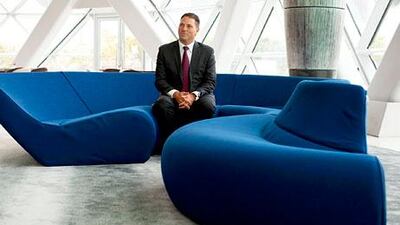A tax on carbon emissions does not have to mark the death knell of heavy industry, a top Australian envoy said at the World Future Energy Summit (WFES) in Abu Dhabi.
Richard Marles, the Australian parliamentary secretary for foreign affairs, said last week such a tax can be introduced "without the sky falling in".
"It's been very politically difficult for us in Australia, but because we know that we need to be reducing our emissions, we've stayed the course," said Mr Marles in an interview on the sidelines of the WFES.
"I think that it is increasingly becoming accepted in Australia that this is the way to go … and it is actually something that the economy can cope with."
Australia in July began charging some 300 companies AU$23 (Dh88) for every tonne of carbon they emit. Industries that rely heavily on exporting their goods, such as aluminium smelters, are allowed to benefit from a more gradual tax.
"The assistance that's provided to them will be pared back over a period of time, and we'll see them come fully in line with other industries," said Mr Marles.
Aimed at cutting emissions by 5 per cent by 2020, Australia's cap-and-trade system is similar to the one used in the European Union and that has just been introduced in California. It is also politically divisive, with Australia's opposition party pledging to eliminate the carbon tax should it win elections this year.
The best-known carbon market, the EU's, has been so successful at reducing carbon emissions that the price of carbon has collapsed.
Yet governments around the world, from American states to Chinese provinces, are considering creating carbon marketsto address climate change and to make their economies more resilient in a low-carbon future.
Depending on the outcome of United Nations negotiations to come up with a universal pact to curb emissions to take effect in 2020, some nations could be obligated to create cap-and-trade systems to meet mandatory reduction targets.
Masdar, Abu Dhabi's clean energy company, invests in carbon markets and backs projects in developing countries to create reductions, from eliminating gas pipeline leaks in Uzbekistan to introducing a cleaner fuel at an Egyptian weaving factory.
The Australian market is set to link with the European carbon market in 2015, and has plans to link up with future ones.
"Ultimately what we want to see is that the carbon market we're building in Australia integrates with a global carbon market," said Mr Marles. "We think that this is the way which the world needs to move."
Mr Marles said last week that the UAE is Australia's base in the Middle East for business, defence and foreign policy.
A UAE nuclear cooperation agreement signed last July had given a "considerable boost to the uranium industry in Australia after the world's confidence in nuclear power was shaken due to Japan's Fukushima accident in 2011", he said.

